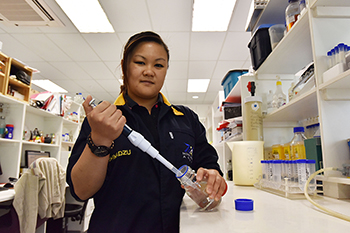Latest News Archive
Please select Category, Year, and then Month to display items
06 February 2019
|
Story Rulanzen Martin

Welcome to a brand-new year, Kovsies! The first edition of Kovsie Advice is out and there to help you make sense of this crazy, bustling jungle of university. With an array of opportunities at Kovsies, it is time to make your own way into your future. This magazine is aimed at helping you find your way through this maze, from FGG to Mabaleng, to making the best of your studies.
Follow our three simple steps to give you that academic edge and the support you need.
Time to tie your shoelaces and get reading!
Kovsie Advice is compiled by the Advising team in the Centre for Teaching and Learning.
Happy reading!
The impact of personal care products on water resources in the Free State
2015-12-14

Jou-an Chen
Photo: Charl Devenish
|
Water is of the utmost importance in personal hygiene. Most people can hardly have a day go by without taking a shower in the morning and at night. However, it is this very habit that is increasingly polluting the water resources in South Africa.
Contaminants found in pharmaceutical and personal care products have been accumulating in water masses in recent years. These contaminants especially refer to hormones in medication, as well as colouring agents and fragrances used in soap, shampoo and body lotions.
“Little information and data are available on the prevalence of these contaminants, and on how high the level of pollution really is,” says Jou-an Chen, researcher in the Department of Microbial, Biochemical and Food Biotechnology at the UFS.
Her research particularly focuses on the prevalence and impact of those contaminants.
“Because these substances have not been properly investigated, we are not sure how widely it occurs and whether it is harmful to the environment. It was precisely the lack of information that has inspired me to investigate further.”
“If we could identify the contaminants and what it is doing to the environment, it could make a valuable contribution to directives on water quality standards.”